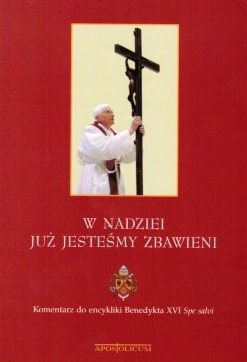In hope we are saved: Afterword
Komentarz do encykliki Benedykta XVI "Spe salvi" / A commentary to the "Spe salvi" encyclical, English translation (Afterword)

Rev. Jerzy Lewandowski
HOPE IN SALVATION AND SALVATION IN HOPE
In hope we are saved
A Commentary on Benedict XVI's encyclical letter Spe salvi
A Collective translation reviewed and corrected by Filip Maj
Warszawa 2010
Afterword
Theological salvation is not an illusion of power; nor is it just a pleasant memory. It is connected with the present time which creates love. Theological love has the power to transcend time into eternity, and eternity into the time of everyday life. His love alone gives us the possibility of soberly persevering day by day, without ceasing to be spurred on by hope, in a world which by its very nature is imperfect (Encyclical, n° 31). He who experiences this love, learns the rules of salvation as an eternity, even if the feeling lasts for milliseconds, for no longer than a prayer, a sigh or breath, or a thought that streaks across the paths of man's consciousness and unconsciousness. Man saves himself every day maintaining his hope in love, which gives him faith in the saving power of God.
Separated from God, not believing in Him, man can still live a life, better or worse. He can enjoy successes or suffer defeats, be sick or healthy, live any life if that is the choice he makes thanks to his freedom. Other consequences of this freedom shall follow. One of them will be a life deprived of a metaphysical perspective of salvation, a possibility all those who find God in their love await for.
Yet, is it possible to live fully without a metaphysical hope for salvation or even without the hope that saves? Perhaps he can, but whenever man places himself in the positions of God and tries to play God's role on his own initiative, he ends tragically. He who does so dies. As do those who are forced to admire this role or to believe in it. Man needs God in order to be a man himself. This is what saves him from tyranny, paranoia and all the psychopathology of life, through which the deficit of goodness in the world and its imperfection manifest themselves. In this sense, man is condemned to his freedom, positive and negative, which the love of God accompanies and secures.
Being a man is a unique state in the world, whose creator is God and His love. In it and through it, we can discern what determines that man is man, a plant is a plant, an animal is animal, and God is God. His love is at the same time our guarantee of the existence of what we only vaguely sense and which nevertheless, in our deepest self, we await: a life that is „truly” life (Encyclical, n° 31). The life of man, which was created just after the creation of the world, belongs to this world and to the moment that precedes the world, i.e. to eternity. And eternity is a trait, an attribute and name of God. Man is entrusted to his freedom for a period of time to be able to discover, through faith, that true life is salvation in hope, and that salvation is eternal life in love.
Benedict XVI's principal master in matters of faith realizing itself in hope and love is St Augustine. He compiled a list of sixteen ethical and pedagogical tasks that form the core of the Christian praxeology of faith (which I have numbered here):
1) The turbulent have to be corrected, 2) the faint-hearted cheered up, 3) the weak supported;
4) the Gospel's opponents need to be refuted, 5) its insidious enemies guarded against; 6) the unlearned need to be taught, 7) the indolent stirred up, 8) the argumentative checked; 9) the proud must be put in their place, 10) the desperate set on their feet, 11) those engaged in quarrels reconciled; 12) the needy have to be helped, 13) the oppressed to be liberated, 14) the good to be encouraged, 15) the bad to be tolerated; and [unfortunately!] 16) all must be loved (Sermo 340, 3, PL 38, 1484; cf. F. Van der Meer, Augustinus der Seelsorger, (1952), 318. qtd. in Encyclical, n° 29). It would be good not only for every single priest or Christian politician but also for every man of faith to know and observe these rules. They were formulated by St Augustine for the needs of Roman Africa, which in his times was gradually decaying culturally and politically. They are still valid today, when all the signs of a breakdown of the modernistic project of the world are visible. We need new descriptions of faith as hope which saves.
Bibliography
Augustine St (1978), The Greatness of the Soul, transl. by J. M. Colleran, New York: The Newman Press
Bacon, F. (1905), The philosophical works of Francis Bacon : Baron of Verulam, Viscount St Albans, and Lord High Chancellor of England, reprinted from the texts and translations with the notes and prefaces of Ellis and Spedding / edited with an introduction by John M.
Robertson, London : George Routledge
Benedict XVI (2007), Encyclical Spe Salvi, Vaticana: Libreria Editrice
Dąbrowski, K. (1980), Myśli i aforyzmy egzystencjalne, Zagórze
Dąbrowski, K. (1964), Positive Disintegration, Boston, Mass.: Little Brown
Drewermann, E. (1996), Przemoc i chrześcijaństwo [Violence and Christianity], Kraków
Elzenberg, H. (2002), Kłopot z istnieniem [Trouble with Existence], Toruń
Freud, S. (1962), Civilisation and its Discontents, transl. and edited by J. Strachey, New York: W. W. Norton and Company
Heidegger, M. (1927), Sein und Zeit, Halle
The Holy Bible, (2006), Revised Standard Version Catholic Edition, 2nd edition
Jaspers, K. (1932), Philosophie, Berlin
Jędraszewski, M. (1990), Wobec innego, PWT, Poznan
John of the Cross, St (1986), Dzieła, Kraków
Kierkegaard, S. (2000), Dziennik, wybór, Lublin
Kobierzycki, T. (2008), Conversation in February 2008, Warsaw
Lubac, Henri de (1983), Catholicisme. Aspects sociaux du dogme, Paris
Pascal, B. (1977), Pensées, Paris: Gallimard
Philo (1993), The Works of Philo: Complete and Unabridged, transl. C. D. Yonge, Hendrickson Pub.
Ratzinger, J. (Card.) (2005), Nowa pieśń dla Pana. Wiara w Chrystusa a liturgia dzisiaj [A New Song for the Lord: Faith in Christ and Liturgy Today], Kraków
Renault, E. (1924), Święta Teresa z Avila, Kraków
Theresa of Jesus, St (1944) Podniety miłości Bożej. "Głos Karmelu", Kraków;
„Letters of St Teresa” (1902), translated from the Spanish by The Rev. John Dalton, London: Thomas Baker
Unterman, A. (2003), Encyklopedia tradycji i legend żydowskich, Warszawa: Książka i Wiedza
Węclewski, Z. (1929), Słownik grecko-polski [Greek-Polish Dictionary], Lviv
Wojtyła, K. (1979), The Acting Person, transl. by A. Potocki. Boston: Reidel
Wojtyła, K. (2001), Miłość i odpowiedzialność. Towarzystwo Naukowe KUL, Lublin
Zieliński, T. (1921), Religia starożytnej Grecyi. Zarys ogólny, Warszawa-Kraków
opr. mg/mg



















